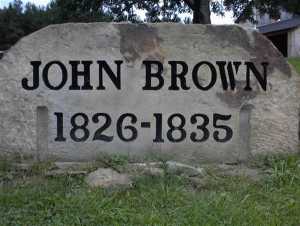October 29th, 1859 will mark the 150th anniversary of John Brown’s ill fated raid on the federal arsenal at Harper’s Ferry. The action is generally seen as a prelude to the opening of the violent and bloody American Civil War several years later in 1861. Those events are in our recent past; 150 years ago just isn’t that long ago.
Brown is probably best known for the raid, an attack which he had hoped would start a general rebellion among the slaves in southern plantations. He was no stranger to bloody violence in his zeal to end slavery, which he, and many others, viewed as utterly evil.
Brown was hung for his role in the short-lived uprising on December 2, 1859. His followers, who survived the assault, including three of his sons, were also executed at various dates for their roles.
Brown instantly became a martyr and a folk hero in the north. John Browns Body became a popular marching song during the war; it was sung years afterwards for generations and is still sung today at many freedom festivals.
In the southern states, however, Brown, was considered the supreme arch-villain. Brown not only attacked the federal arsenal, he threatened the money supply for the wealthy – slavery, or essentially, free labor. Brown posed a threat to the southern agricultural economy and he made his case on religious and moral grounds.
There are some little known insights into John Brown who was more than a folk hero and a violent abolitionist. For many years (1826-1836), he farmed 200 acres in northwestern Pennsylvania and operated a small tannery in a place there called New Richmond.
He was a land surveyor, appointed as the Post Master for the area, started the first school in his farmhouse and one of the local area’s first churches. He was also involved in the peaceful and secretive, mass civil disobedience of the time period, the Underground Railroad.
His farm is a museum today and the cemetery where his first wife and two young children are buried still remains. All three died of natural causes on the homestead.
Brown also had some views on education as a tool for bringing an end to slavery. In an 1834 letter to his brother Frederick, he wrote: “If the young blacks of our country could once become enlightened, it would most assuredly operate on slavery like firing powder confined in rock, and all the slaveholders know it well. Witness their heaven daring laws against teaching blacks. If once the Christians in Free states would set to work in earnest in teaching the blacks, the people of the slaveholding states would find themselves constitutionally driven to set about the work of emancipation immediately.”
Anniversaries are a time to recall, remember and re-examine and 150 years ago just isn’t that distant. Brown lived in a time period of extremism and terrorism on both sides of the slavery issue, it was bloody, violent and filled with horrible atrocities. It wasn’t the good old days portrayed in popular culture.
The past is never really past, it still lingers on and, yes, honest history can be a guide for better living and an improved quality of life, if we take the time to listen.
“Our lives begin to end the day we become silent about the things that matter,” Martin Luther King.
